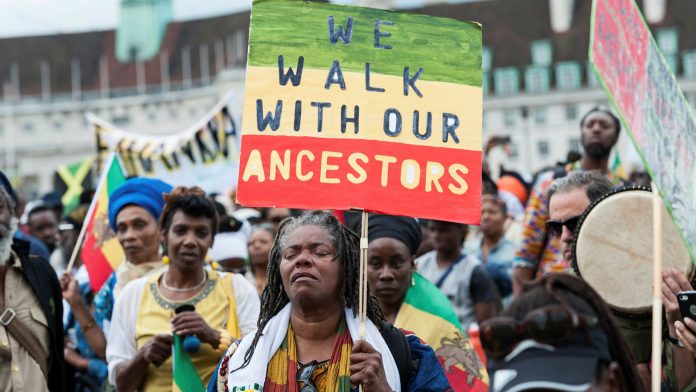Activists from organizations in Africa and the Caribbean have demanded compensation for slavery‘s historical wrongs and the effects they have had on modern society.
In order to demand restitution for these “historical crimes,” the University of the West Indies (UWI), the Economic, Social and Cultural Council of the African Union (AU), the Government of Barbados, the grant-making network Open Society Foundations, and the Caribbean Pan-African Network came together in Bridgetown, Barbados.
The UWI said in a statement that the meeting, which took place in Bridgetown from Monday to Thursday, featured strategy and plenary sessions and marked the beginning of a “ground-breaking” transcontinental campaign.
At the ceremony were ambassadors and officials from CARICOM and member states of the African Union (AU).
The meeting is a historic occasion that is required for humanity, according to Hilary Beckles, chair of the CARICOM reparations commission, who stated this at a news conference on Thursday.
“This is a significant occasion. With all the negative influences brought on by colonization, humanity cannot progress. To enable humanity to function, we must clear up this mess, she declared.
In its 10-point reparation plan, the CARICOM reparations commission, which was established to demand reparations from former colonial powers like Britain, France, and Portugal, stated that it “sees the persistent racial victimization of the descendants of slavery and genocide as the root cause of their suffering today.”.
The meeting’s outcomes, according to the UWI statement, include a proposal for a roadmap for increased cooperation between the African Union and CARICOM.
A representative of the AU, Yousseouf Mandoha, stated: “It is critical to understand how racism, colonialism, and slavery intersect and affect the lives of Black people globally.”
At least 12.5 million Africans were kidnapped, forcibly transported, and sold as slaves by European ships and traders between the 15th and 19th century.
Those who made it through the harrowing voyage were eventually employed under cruel conditions on plantations in the Americas, primarily in Brazil and the Caribbean, while others benefited from their labor.
Between 1627 and 1833, 600,000 African slaves were brought to Barbados, where the meeting was held. These slaves helped English plantation owners by working on their sugar cane farms and earning a fortune for them.
In 2021, the Caribbean island removed the late Queen Elizabeth II from her position as head of state and relaunched its reparations campaign.
Reparations and other forms of compensation for slavery have a long history, but the movement is gaining ground globally.
Earlier this month, the European Union declared that the slave trade in Europe’s past resulted in “untold suffering” for millions of people and demanded compensation for what it referred to as “crimes against humanity.”













